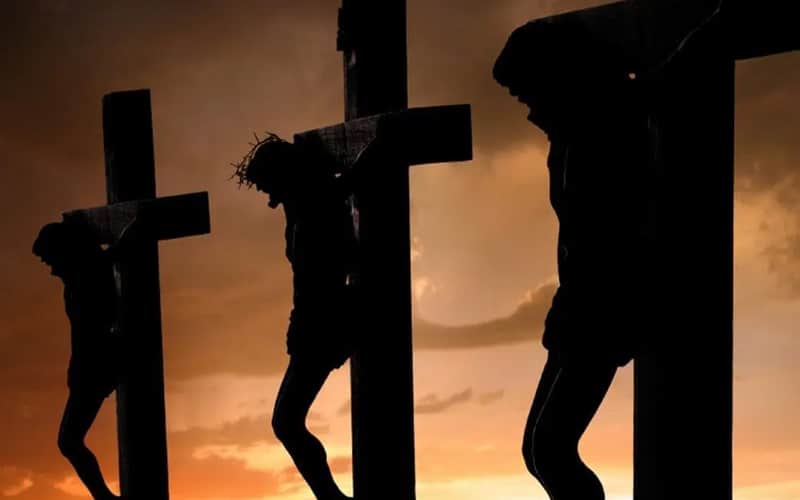
Saved By God, From God, For God
Christians are notorious for using a vocabulary that is not always understood by those around them. There’s no doubt that we have our own lingo and jargon.
One such word is the word “saved.” Often, Christians ask unsuspecting neighbors, colleagues and friends the question, “are you saved?” and usually receive only puzzled expressions in response. These folk are desperately trying to understand the question, but have no reference point whatsoever from which to make an assessment of how to answer. The Christian, on the other hand, seeing this as a wonderful opportunity to evangelize, usually pounces on this hesitation, though just how much is communicated in such times is open to debate. Though the Christian is usually sincere in desiring to share his faith, he needs to provide some foundation for the person to understand what he is seeking to communicate.
Yet in saying this, the word “saved” is very much a biblical word. The scripture says, “whoever will call on the name of the Lord will be saved.” (Romans 10:13)
But what exactly is this referring to? What is it that those who call on the name of the Lord are saved from?
Well let’s take a look at the word “saved.” It is a word we use quite often, especially in the world of sports. We talk of a goalkeeper making a great “save,” or a boxer being “saved” by the bell. When used in this context, the word “saved” does not have any eternal significance to it whatsoever, but refers instead to a present day deliverance or rescue from calamity. The goalkeeper doesn’t provide eternal life for his team mates when he makes a save, but merely prevents a calamity – conceding a goal to the opposing team. The boxer doesn’t gain heavenly bliss because the bell rings, but the sounding of the bell signalled the end of a round when it looked certain that the fighter was about to lose the fight. Again, the word saved refers to being rescued from a calamity.
So what exactly does the Bible mean then when it talks of our need to be saved? What is the calamity from which we need to be rescued?
The Bible’s answer is a very clear one. God is holy and He is just. That’s not good news if we happen to be sinners, which the Bible declares that we are. All of us have sinned and fall short of God’s glory (Romans 3:23). But thank God, that’s not the end of the story. But it gets a lot worse before it gets better!
God is good. God is also just. God is therefore a good judge and must punish sin. God’s justice will be meted out precisely as justice demands it – which when you think about it, is the worst of all possible news for us. We won’t be able to get away with anything – all the secrets of our hearts will be exposed, and we will be called to give an account of our lives. What is worse is that the sins we have committed are so grievous to Him that the punishment for sin is eternal in duration. In fact, rather than the judgment we will face being merely being left or abandoned by God, God is actually active in pouring out His wrath against our sin.
So what exactly does the Bible mean by the phrase, “the wrath of God?”
Well one thing we notice very clearly when we study the Bible on this issue is that wrath is not an isolated concept made up by merely one “out of sorts and grumpy prophet.” There are in fact over 600 references to God’s wrath in the Old Testament alone.
Two incidents in Exodus will help our understanding at this point. In Exodus 22:22-24, God says, “You shall not mistreat any widow or fatherless child. If you do mistreat them, and they cry out to me, I will surely hear their cry, and my wrath will burn, and I will kill you with the sword, and your wives shall become widows and your children fatherless.”
Then later on when the children of Israel make for themselves a golden calf to worship, the scripture records God as saying, “Now therefore let me alone, that my wrath may burn hot against them and I may consume them, in order that I may make a great nation of you.” But Moses implored the LORD his God and said, “O LORD, why does your wrath burn hot against your people, whom you have brought out of the land of Egypt with great power and with a mighty hand? Why should the Egyptians say, ‘With evil intent did he bring them out, to kill them in the mountains and to consume them from the face of the earth’? Turn from your burning anger and relent from this disaster against your people.” (Exodus 32:10-12)
Regarding this, Dr. James Montgomery Boice writes, “it is evident in this passage that Moses’ appeal to God is not based either on imagined innocence of the people (they were not innocent, and Moses knew it), nor on the thought that wrath was unworthy of God. Moses appeals only on the basis of God’s name and how his acts would be misconstrued by the heathen. No doubt is expressed that wrath is a proper reaction of God’s holy character against sin.” Dr. Boice goes on to say, “God’s wrath is not arbitrary, as if God for some minor matter or according to his own caprice simply turns against those whom he formerly loved and favored. On the contrary, wrath is God’s consistent and unyielding resistance to sin and evil. In the first passage it is wrath brought on by sin against others, widows and orphans. In the second passage it is wrath brought on by sins against God.” (Foundations of the Christian Faith, p. 248)
Nahum 1:2-3, 6-8 declares, “The LORD is a jealous and avenging God; the LORD is avenging and wrathful; the LORD takes vengeance on his adversaries and keeps wrath for his enemies. The LORD is slow to anger and great in power, and the LORD will by no means clear the guilty. His way is in whirlwind and storm, and the clouds are the dust of his feet. Who can stand before his indignation? Who can endure the heat of his anger? His wrath is poured out like fire, and the rocks are broken into pieces by him. The LORD is good, a stronghold in the day of trouble; he knows those who take refuge in him. But with an overflowing flood he will make a complete end of the adversaries, and will pursue his enemies into darkness.”
Again, many more scriptures would verify the reality and nature of the wrath of Almighty God. Psalm 2:5-9 says, “Then he will speak to them in his wrath, and terrify them in his fury, saying, “As for me, I have set my King on Zion, my holy hill.” I will tell of the decree: The LORD said to me, “You are my Son; today I have begotten you. Ask of me, and I will make the nations your heritage, and the ends of the earth your possession. You shall break them with a rod of iron and dash them in pieces like a potter’s vessel.”
In the New Testament, the wrath of God is also clearly seen. Two main words for wrath are used. The first, thymos (in Greek) means “to rush along fiercely,” “to be in the heat of violence,” or “to breath violently.” It refers to a panting rage.
The second Greek word, orge, means “to grow ripe for something” with the noun form revealing that this wrath has been slowly building over a long space of time. It is a gradually building anger that rises in intensity, and therefore is not so much a sudden flare up of hostility, which is soon over, but rather as Leon Morris defines it, “a strong and settled opposition to all that is evil arising out of God’s very nature.” (Leon Morris, The Apostolic Preaching of the Cross)
Romans 1:18-20 reveals the present day reality of this wrath. “For the wrath of God is revealed from heaven against all ungodliness and unrighteousness of men, who by their unrighteousness suppress the truth. For what can be known about God is plain to them, because God has shown it to them. For his invisible attributes, namely, his eternal power and divine nature, have been clearly perceived, ever since the creation of the world, in the things that have been made. So they are without excuse.”
Romans 2:5 “But because of your hard and impenitent heart you are storing up wrath for yourself on the day of wrath when God’s righteous judgment will be revealed.”
Are we all feeling the weight of this bad news yet? I don’t believe we will appreciate the amazing good news of the Gospel until we do.
Jesus is also coming back to rule and reign. When He does so, it will not be like His first coming when He came as a humble baby, born in a manger, but He’s coming back as King of Kings and Lord of Lords, to enforce His rule in our world.
Revelation 19:15 declares, “From his mouth comes a sharp sword with which to strike down the nations, and he will rule them with a rod of iron. He will tread the winepress of the fury of the wrath of God the Almighty.”
Although this refers to a future event, the scripture reveals that the wrath of God is a present reality, as we’ve already seen through Romans 1:18. The scripture also says, “Whoever believes in the Son has eternal life; whoever does not obey the Son shall not see life, but the wrath of God remains on him.” (John 3:36)
I can’t think of a worse calamity than this one – facing the full fury of the wrath of God against our sin.
But is it just for God to punish sinners for eternity?
Let me respond with a quote from the great theologian, Jonathan Edwards, “Our obligation to love, honor, and obey any being, is in proportion to his loveliness, honorableness, and authority; for that is the very meaning of the words. When we say any one is very lovely, it is the same as to say, that he is one very much to be loved. Or if we say such a one is more honorable than another, the meaning of the words is, that he is one that we are more obliged to honor. If we say any one has great authority over us, it is the same as to say, that he has great right to our subjection and obedience. But God is a being infinitely lovely, because he has infinite excellency and beauty. To have infinite excellency and beauty, is the same thing as to have infinite loveliness. He is a being of infinite greatness, majesty, and glory; and therefore he is infinitely honorable. He is infinitely exalted above the greatest potentates of the earth, and highest angels in heaven; and therefore he is infinitely more honorable than they. His authority over us is infinite; and the ground of his right to our obedience is infinitely strong; for he is infinitely worthy to be obeyed himself, and we have an absolute, universal, and infinite dependence upon him. So that sin against God, being a violation of infinite obligations, must be a crime infinitely heinous, and so deserving of infinite punishment. The eternity of the punishment of ungodly men renders it infinite. (THE JUSTICE OF GOD IN THE DAMNATION OF SINNERS, Works, vol. 1; 669)
In light of this, it is merely the pleasure of God Himself that His wrath did not fall on us last night, or last week, or last year. In fact, it is very evident that God has been remarkably patient with us all.
So then, if facing the full brunt of the wrath of God for all eternity is the worst possible calamity, then the greatest deliverance becomes immediately clear. To be saved, is to be rescued from the wrath of Almighty God.
In His love, God sent His Son to deliver us or rescue us from His eternally fierce wrath against our sin. John 3:16 says, “For God so loved the world, that he gave his only Son, that whoever believes in him should not perish but have eternal life.”
1 Thessalonians 1:9-10 declares, “For they themselves report concerning us the kind of reception we had among you, and how you turned to God from idols to serve the living and true God, and to wait for his Son from heaven, whom he raised from the dead, Jesus who delivers us from the wrath to come.”
Romans 5:6-9 “For while we were still weak, at the right time Christ died for the ungodly. For one will scarcely die for a righteous person – though perhaps for a good person one would dare even to die – but God shows his love for us in that while we were still sinners, Christ died for us. Since, therefore, we have now been justified by his blood, much more shall we be saved by him from the wrath of God.”
Question: Whose love is it?
Answer: God’s
Question: Whose wrath is it?
Answer: God’s
It was God’s idea to save all who believe in Christ from the ultimate calamity, the fierceness of the wrath of God.
What a deliverance! What a rescue! God sent His Son to save us from His wrath. To put it in clear terms – we are saved by God, from God, for God!
On the cross, Jesus bore our sin, and God poured out His wrath on Him, in our place. He took the punishment we deserved as He bore our sins in His body on the tree (1 Peter 2:24). Jesus bore the wrath of God on behalf of His people. All who believe in Him as Savior and Lord are forever rescued from this wrath. But for those who do not receive the Son of God, God’s wrath is being revealed (Romans 1:18) and the full brunt of that wrath will be meted out in judgement.
To these, Jesus says, “Behold, I am coming soon, bringing my recompense with me, to repay everyone for what he has done. I am the Alpha and the Omega, the first and the last, the beginning and the end.” (Revelation 22:12-13)
The scripture declares, “How shall we escape if we neglect such a great salvation?” (Hebrews 2:3) The answer to this rhetorical question is clear. If we neglect this great salvation, there will be no escape. Indeed, “It is a fearful thing to fall into the hands of the living God.” (Hebrews 10:31)
So again, here’s the good news: “if you confess with your mouth that Jesus is Lord and believe in your heart that God raised him from the dead, you will be saved. For with the heart one believes and is justified, and with the mouth one confesses and is saved. For the Scripture says, “Everyone who believes in him will not be put to shame.” For there is no distinction between Jew and Greek; the same Lord is Lord of all, bestowing his riches on all who call on him. For “everyone who calls on the name of the Lord will be saved.” Romans 10:9-13
Call out to Him now.


